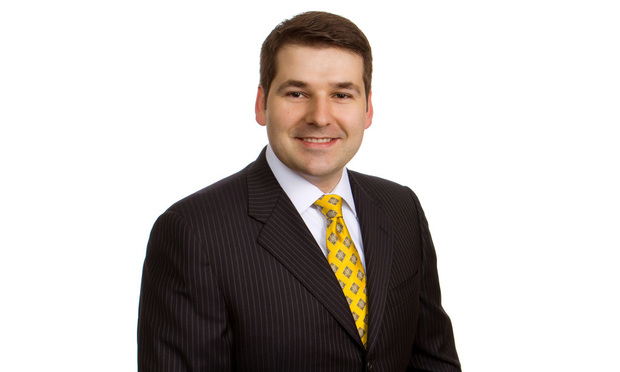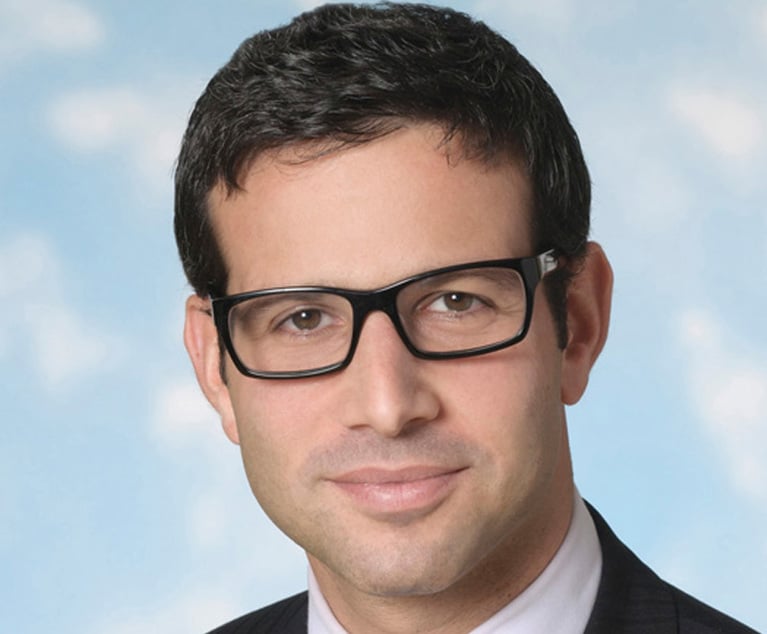On the Rise 2018: Eagle Robinson
Eagle Robinson, partner, Norton Rose Fulbright
August 31, 2018 at 06:00 AM
5 minute read
 Eagle Robinson, partner with Norton Rose Fulbright.
Eagle Robinson, partner with Norton Rose Fulbright.
Eagle Robinson, partner, Norton Rose Fulbright
Experience:
- Norton Rose Fulbright, 2008-present
- Dunlap Codding, 2006-2008
Education:
- University of Oklahoma College of Law, 2008
- University of Oklahoma, 2004
What drew you to a career in law?
The TV show Boston Legal, and my own short attention span. William Shatner's Denny Crane and James Spader's Alan Shore, fictional as they were, made being a lawyer seem like an entertaining and challenging way to earn a living. Also, during a year of working as an engineer before law school, the projects on which I worked were similar enough to feel repetitive. That was probably a function of my inexperience, but it was enough to make me crave variety. I've been fortunate in that the law has not disappointed on either front.
Have you set a specific goal that you want to achieve in the next year?
My goal this year and every year is simply to serve clients' legal needs better than anyone else is willing or able to serve them. That translates into smaller goals, for each project, which I generally consider to have been met each time a client trusts our team (instead of another firm's) with an additional project. The rest of my professional goals align with clients' goals, in both substance and timeline.
What has been your proudest career moment and your biggest hurdle?
My proudest career moment has been making partner at Norton Rose Fulbright. The firm includes many highly successful partners, and it was a tremendous honor to be invited to join their ranks. My biggest hurdle has been balancing my tendency to work too much, with my need to spend time with my family. My inability to say “no” at work is a defect of my character that has made it particularly difficult to make a habit of reserving and defending that family time.
Where do you fit on a 1-10 work-life balance scale with 10 being nirvana? Please explain.
Either 6 or 8, depending on the day. Outside of travel and a few exceptionally busy weeks here and there, I make it home by 6 pm to have dinner with my kids, help put them to bed, and spend time with my better half before she goes to bed. My biggest challenge is quieting the part of my brain that never stops thinking about whatever problem is most pressing, which sometimes makes it difficult to be fully present during non-working hours.
What is the top quality that you've used to succeed in the profession?
Humility. While a certain level of self-confidence is a must, overconfidence breeds strategic mistakes. For example, underestimating an opponent can lead to underestimating (and under-thinking) their arguments. Humility means setting aside any snap judgments or impressions of an argument or opponent to fully consider the merits, without which any response can miss critical points. In my mind, humility also means listening carefully not only to client problems but also to the level of solution each client thinks appropriate. The alternative is overworking a problem and sending a solution and a bill that the client didn't foresee or want.
Who is your favorite mentor and why?
All of them. Each mentor I've been fortunate enough to know has shared some bit of wisdom I try to live by. A few of my favorites include: quality is never negotiable; service is servient; presentation is everything, but never enough; clients ask 'yes' questions; and practicing law is a marathon of sprints (I might've tweaked that last one).
What's the best advice anyone has ever given you?
“You should have been fired.” At the age of 16, I was slightly insubordinate to the manager of the pizza place where I worked. He had done something unfair to a co-worker and I took a stand that seemed principled to my idealistic young mind. When I told the story to my stepmother that evening, she quickly disabused me of any high-minded misimpressions, and explained that what seemed unfair was trivial and better for the business. In refusing to pull any punches, she made it crystal clear that I served at the pleasure of my employer and, when on the clock, my frame of reference should align with my employer's. That lesson underscores what seem to me the keys to success in the practice of law: the willingness to selflessly prioritize not only client needs, but also each client's perception of how its needs are best served.
What trends are you observing in the profession that you're excited about?
The development of technology that reduces the amount of time spent on repetitive or formulaic tasks. For example, there is now software that will generate from a draft set of patent claims a detailed description for a patent application. Likewise, software can now perform an initial review of a set of contracts and flag key contract provisions for detailed review. These types of advancements help lawyers focus their efforts on critical issues and increase value for clients.
What is the greatest challenge you see for the legal profession?
The inherent tension between “Type A” personalities and the legal profession being one of service. Lawyers seem to go awry when they forget that any lawyer's relevance depends more on being trusted by clients than on any other factor. No matter how brilliant, a lawyer who prioritizes their own desires over those of their clients will eventually find themselves with nothing to lawyer.
This content has been archived. It is available through our partners, LexisNexis® and Bloomberg Law.
To view this content, please continue to their sites.
Not a Lexis Subscriber?
Subscribe Now
Not a Bloomberg Law Subscriber?
Subscribe Now
NOT FOR REPRINT
© 2025 ALM Global, LLC, All Rights Reserved. Request academic re-use from www.copyright.com. All other uses, submit a request to [email protected]. For more information visit Asset & Logo Licensing.
You Might Like
View All
Kirkland's Daniel Lavon-Krein: Staying Ahead of Private Equity Consolidation

Vinson & Elkins: Traditional Energy Practice Meets Energy Transition
4 minute read
Advising 'Capital-Intensive Spaces' Fuels Corporate Practice Growth For Haynes and Boone
4 minute read
Get to Know Texas Lawyer's Attorney of the Year Finalists
Trending Stories
- 1Sharpening Residential Insurance Fraud Defense Strategies: Insights for Insurers to Mitigate Risk in 2025
- 2Reversal of Fortune: Restoring Owners’ Equity Under New Jersey’s Tax Sale Law
- 3Black Judges Discuss Growing Up During Segregation, Efforts to Diversify the Profession
- 4As They Dissolve the Firm, Equity Partners in Houston Trial Firm Hodges & Foty Dispute Over Access to Bank Accounts
- 5How I Made Office Managing Partner: 'Always Be Willing to Work Harder Than the Person Next to You,' Says Esther Cho of Stradley Ronon
Who Got The Work
J. Brugh Lower of Gibbons has entered an appearance for industrial equipment supplier Devco Corporation in a pending trademark infringement lawsuit. The suit, accusing the defendant of selling knock-off Graco products, was filed Dec. 18 in New Jersey District Court by Rivkin Radler on behalf of Graco Inc. and Graco Minnesota. The case, assigned to U.S. District Judge Zahid N. Quraishi, is 3:24-cv-11294, Graco Inc. et al v. Devco Corporation.
Who Got The Work
Rebecca Maller-Stein and Kent A. Yalowitz of Arnold & Porter Kaye Scholer have entered their appearances for Hanaco Venture Capital and its executives, Lior Prosor and David Frankel, in a pending securities lawsuit. The action, filed on Dec. 24 in New York Southern District Court by Zell, Aron & Co. on behalf of Goldeneye Advisors, accuses the defendants of negligently and fraudulently managing the plaintiff's $1 million investment. The case, assigned to U.S. District Judge Vernon S. Broderick, is 1:24-cv-09918, Goldeneye Advisors, LLC v. Hanaco Venture Capital, Ltd. et al.
Who Got The Work
Attorneys from A&O Shearman has stepped in as defense counsel for Toronto-Dominion Bank and other defendants in a pending securities class action. The suit, filed Dec. 11 in New York Southern District Court by Bleichmar Fonti & Auld, accuses the defendants of concealing the bank's 'pervasive' deficiencies in regards to its compliance with the Bank Secrecy Act and the quality of its anti-money laundering controls. The case, assigned to U.S. District Judge Arun Subramanian, is 1:24-cv-09445, Gonzalez v. The Toronto-Dominion Bank et al.
Who Got The Work
Crown Castle International, a Pennsylvania company providing shared communications infrastructure, has turned to Luke D. Wolf of Gordon Rees Scully Mansukhani to fend off a pending breach-of-contract lawsuit. The court action, filed Nov. 25 in Michigan Eastern District Court by Hooper Hathaway PC on behalf of The Town Residences LLC, accuses Crown Castle of failing to transfer approximately $30,000 in utility payments from T-Mobile in breach of a roof-top lease and assignment agreement. The case, assigned to U.S. District Judge Susan K. Declercq, is 2:24-cv-13131, The Town Residences LLC v. T-Mobile US, Inc. et al.
Who Got The Work
Wilfred P. Coronato and Daniel M. Schwartz of McCarter & English have stepped in as defense counsel to Electrolux Home Products Inc. in a pending product liability lawsuit. The court action, filed Nov. 26 in New York Eastern District Court by Poulos Lopiccolo PC and Nagel Rice LLP on behalf of David Stern, alleges that the defendant's refrigerators’ drawers and shelving repeatedly break and fall apart within months after purchase. The case, assigned to U.S. District Judge Joan M. Azrack, is 2:24-cv-08204, Stern v. Electrolux Home Products, Inc.
Featured Firms
Law Offices of Gary Martin Hays & Associates, P.C.
(470) 294-1674
Law Offices of Mark E. Salomone
(857) 444-6468
Smith & Hassler
(713) 739-1250






